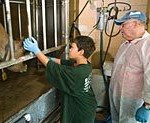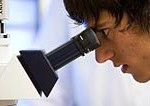Category Science & Technology
UW-Madison Day at the State Fair
The University of Wisconsin–Madison's legacy of service and outreach to the state of Wisconsin will be celebrated at the Wisconsin State Fair on Wednesday, Aug. 6.
Symbiotic microbes induce profound genetic changes in their hosts
Researchers from the UW–Madison School of Medicine and Public Health and the University of Iowa identify a slew of microbe-induced genetic changes in a tiny squid, including a set of evolutionarily conserved genes that may hold the secrets to developing a mutually beneficial relationship.
Recent sightings: Grandparents U.
Sam Iida and his grandfather take part in a hands-on learning exercise highlighting dairy science during Grandparents University on July 22. Grandparents University…
CLA approved as food ingredient
On July 24, the U.S. Food and Drug Administration announced its finding that conjugated linoleic acid, known as CLA, is "generally regarded as safe" for use in foods. UW–Madison researchers have studied CLA since the 1970s.
Study: No gender differences in math performance
A team of scientists says that there aren't gender differences in math performance any longer.
UW-Madison veterinary technicians first to attain oncology, internal medicine specialization
Two more certified veterinary technicians at the University of Wisconsin–Madison School of Veterinary Medicine have attained veterinary technician specialist (VTS) certification, bringing the school's total to seven.
UW-Madison historian predicts the end of science ‘superpowers’
Is the sun beginning to set on America's scientific dominance? Much like the scientific superpowers of France, Germany and Britain in centuries' past, the United States has a diminishing lead over other nations in financial investment and scholarly research output in science and engineering.
NASA co-op pushes student to new frontier of vehicle design
A UW–Madison mechanical engineering student is helping to develop the robotic equipment needed to clear lunar dust.
College of Engineering will sign transfer agreement with MATC
A new door is opening for students seeking entrance to the College of Engineering.
Transportation researchers evaluate Madison Metro service
University of Wisconsin–Madison College of Engineering transportation researchers are compiling the results of ridership surveys conducted in March and April on board Madison Metro buses.
Blood-related genetic mechanisms found important in Parkinson’s disease
A finding by scientists at UW–Madison, Brigham and Women's Hospital and the University of Ottawa may lead to new treatments for Parkinson's disease.
Recent sightings: Stem cell summer science camp
Jose Zepeda, of Ellsworth, Wis., peers into a microscope while participating in a summer science camp hosted at the WiCell Research Institute at…
Families create special memories at Grandparents University
Grandparents and grandchildren are sharing a campus experience as they learn together at Grandparents University.
Faculty expertise central to Grandparents University success
Before strip malls and subdivisions cropped up around Madison, University of Wisconsin–Madison students often earned extra money in the summer by plucking fat, green worms from tobacco plants in nearby Sun Prairie.
Facility to house new instrument to speed biomedical research
Already home to one of the world's most impressive collections of huge research instruments, the University of Wisconsin–Madison's National Magnetic Resonance Facility at Madison (NMRFAM) is about to add another giant.
Engineers Without Borders
Watch a WISC-TV For the Record episode that features UW–Madison’s Engineers Without Borders program.
Morgridge Institute to hold symposium on integration of math, biology
To address the challenge and position UW–Madison scientists for the future, the Morgridge Institute for Research, part of the new Wisconsin Institutes for Discovery, has slated the first symposium on the Integration of the Mathematical and Biological Sciences, to be held Tuesday and Wednesday, Sept. 2-3.
Associate dean advises NASA on human challenges in space programs
A UW–Madison associate dean is part of a committee advising NASA on issues related to a new space program that will send human astronauts to Mars.







